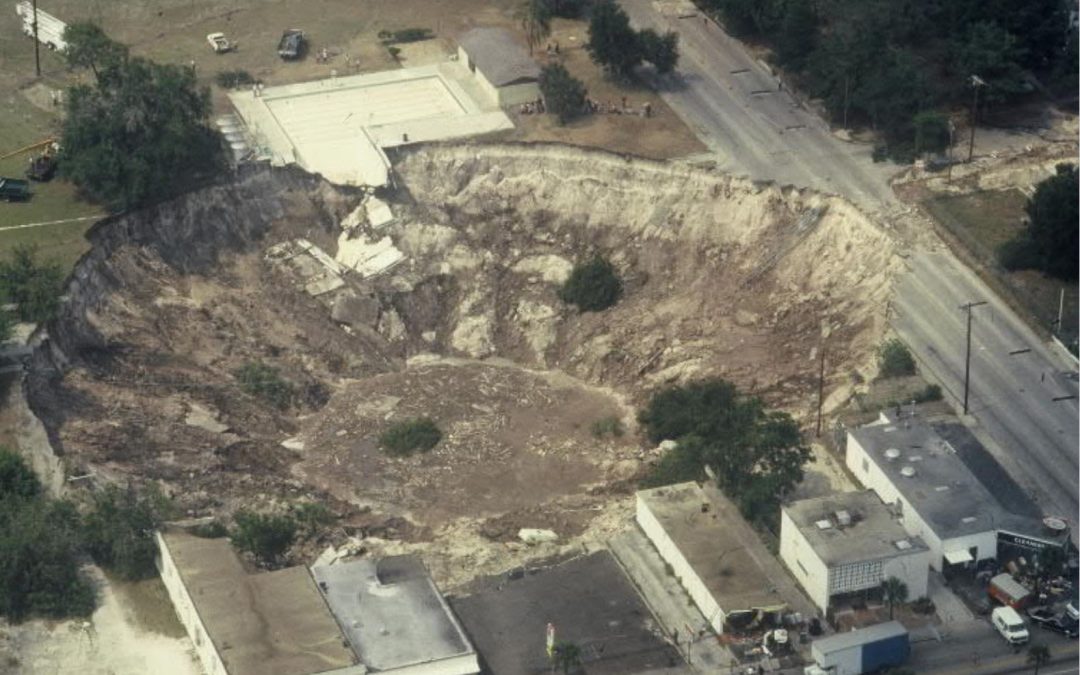
by Beth Kassab | Mar 29, 2024 | City Commission, News, Uncategorized
Commission approves CRA expansion
Sinkhole discussion could lead to more parking at Library & Events Center and leaf blower decision delayed again
March 28, 2024
By Beth Kassab
The City Commission approved a major expansion of the Community Redevelopment Agency, which will generate extra dollars from Orange County to spend on projects and programs in the special district across much of Winter Park’s major commercial corridors.
Before the deal is final, the county commission must OK it as well. A vote is expected this summer.
Mayor Phil Anderson, who was presiding over his final meeting before Sheila DeCiccio is sworn-in as mayor on April 10, said the CRA has been a critical piece of funding projects for “the common good.” The board is planning to use some of the money in the future to address drainage problems in the wake of Hurricane Ian.
“Assuming one agrees that flood prevention is for the common good, then those dollars would have to come from a bond issue, or come from the general fund or it wouldn’t happen,” Anderson said, if the CRA didn’t provide an additional financing option. The commission approved the expansion 5-0.
Several residents, including former Mayor David Johnston, spoke against the expansion, which calls for the CRA to be extended by 10 years — through 2037 — and grow its boundaries by 142 acres by taking in a former industrial area along Fairbanks Avenue west of U.S. 17-92.
Johnston said the CRA has served its purpose and should be allowed to dissolve when it’s set to expire in 2027 if the expansion is not approved.
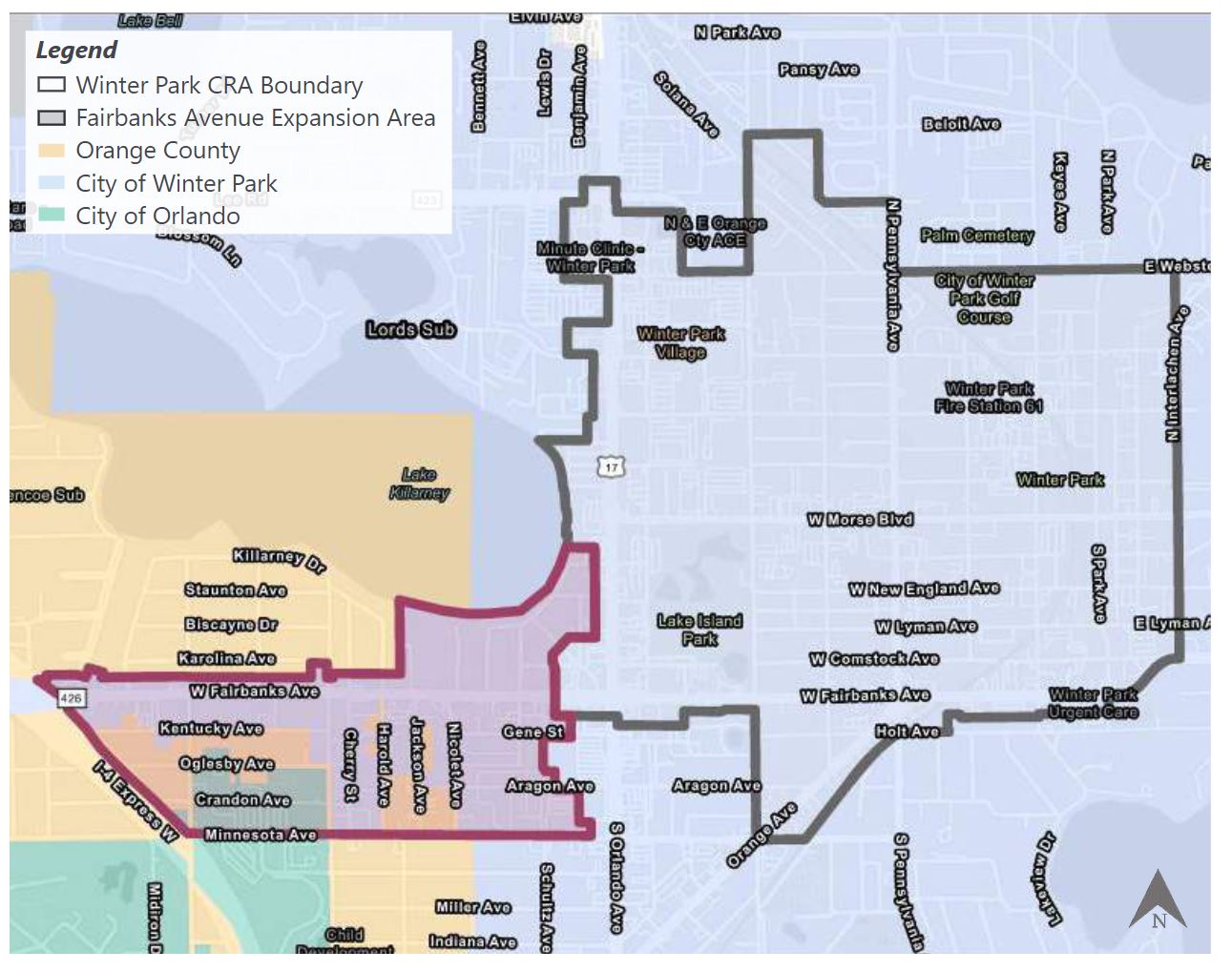
“It’s time to end the CRA,” he said, noting that he was mayor in the early 1990s when the agency was first created.
But commissioners and city staff noted the success of the district, which has helped brick streets, build a community center, rehab housing and business facades and improve streets among other projects. This year money from the CRA also helped to boost the library budget so that it could open on Sundays again.
With the expansion down Fairbanks Avenue, the agency will generate an estimated $70 million a year from Orange County. The new CRA, which is controlled by the City Commission, is projected to generate between $162 million and $213 million in revenue through 2037.
“It’s a very elegant mechanism to make sure more of our taxpayer dollars stay with the city,” said Peter Moore, director of management and budget.
CRA’s are used across Florida by cities and counties as a way to finance redevelopment and specific projects. It works like this: property values within a CRA’s boundaries are frozen at a certain year — in this case that year would be 2023. Then, as values rise, any taxes on those properties collected above the frozen amount go into a CRA fund rather than back to the city and county that would typically collect them. (The city and county still collect taxes each year up to the frozen amount and school board taxes are not affected.)
Sinkhole risk near the library?
Commissioners heard a report from engineer Jay Casper, who assessed the sinkhole risk near the Winter Park Library & Events Center as the city looks to add more parking for the facilities.
Casper said he found no elevated risk of sinkholes despite the proximity to the large sinkhole that opened up in May 1981 (pictured at top of story) on the corner of Denning Drive and Orange Avenue. The sinkhole is now known as Lake Rose.
He showed aerial photos that demonstrated how the area has changed since then, noting a sharp increase in development.
“You see the threat of sinkholes hasn’t stopped people from building,” he said.
He engaged in a technical discussion with commissioners — Mayor Phil Anderson and commissioners Marty Sullivan and Todd Weaver all have engineering backgrounds — related to the soil quality analyzed from drillings in the area.
He said the soil samples he analyzed “showed no indication of any subsurface erosion going on.”
Commissioners asked why, then, small portions of the library parking lot have crumbled after the facility opened in 2022.
“Those were relatively close to the surface,” said Charles Ramdatt, the city’s director of public works, answering that the problem was caused by “construction methods.” “We went in and fixed them. It has nothing to do with the underlying geology and our staff actively monitors that site.”
Leaf blower referendum
Commissioners decided to delay a vote on whether voters should have a say on the gas leaf blower ban until April 24.
The Commission was set to take up the issue on April 10, but there will only be four commissioners in place for that meeting after Sheila DeCiccio is sworn in as mayor earlier that day. A run-off to fill Seat 2, which DeCiccio occupies today, won’t be decided until April 16.
As a result the new commissioner is likely to face a vote about whether to put the ban on the ballot next year at his first meeting.
B&B request
The owners of five of six units at Villa Vienda Condominiums (221 Holt Avenue) opted to delay a vote asking to convert the condos into a bed & breakfast in order to use them as Air B&B or VRBO properties.
The building was historically occupied by Rollins students and the owners are no longer happy with that arrangement because of frequent maintenance issues and the location near the campus makes it difficult to find other renters. As a result they are requesting to comply with the city’s B&B rules.
The matter is now also expected to appear on the April 24 agenda.
WinterParkVoiceEditor@gmail.com
To comment or read comments from others, click here →
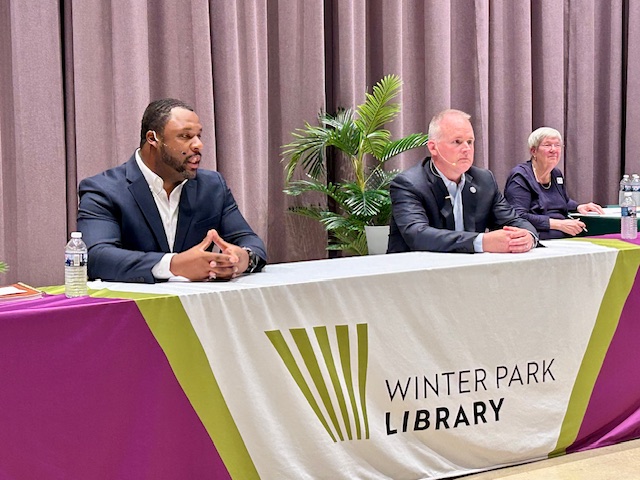
by Beth Kassab | Mar 29, 2024 | City Commission, Election, News, Orange Avenue Overlay, Uncategorized, Zoning and Development
Where Craig Russell and Jason Johnson stand on issues
The Seat 2 candidates will face off in the April 16 run-off election
March 28, 2024
By Beth Kassab
With less than three weeks until the April 16 run-off and mail-in voting already underway, Jason Johnson and Craig Russell are in a heated contest for a City Commission seat with Russell positioning himself as a political outsider who will break barriers of access for the average resident and Johnson running as the candidate who will most closely guard against unchecked development.
Both men are first-time candidates and registered Democrats and both would join Commissioner Kris Cruzada, 50, on the younger spectrum on the City Commission — Russell is 43 and Jason Johnson is 52.
But there are differences in their positions in the technically non-partisan race. Here’s where they stand:
Voter records
Russell’s candidacy might appear as something of a contradiction: If elected, he would be the first Black commissioner in more than a 100 years who, he says, will bring a fresh perspective to the job compared to what he’s called an “elitist” mentality in City Hall. But Russell, a Winter Park High teacher and coach, is also the candidate with the most money, the endorsement of the local Chamber of Commerce and support from former Mayor Ken Bradley and former Commissioner Sarah Sprinkel, whose names have appeared in his social media posts.
Russell, who won the most votes in the March 19 election with 42%, said he wants to “build a government for all residents, not just political insiders.”
He’s embraced the help of the chamber, which has raised money to support him through its political action committee, but also his status as a political newbie.
His voter record, for example, shows he hasn’t voted in a Winter Park municipal election in the last 10 years until his name was on the ballot in March. Russell voted in the 2004, 2012, 2016, 2018 and 2020 November elections and the 2018 August primaries.
Johnson cast more than 35 ballots during that same time, appearing to vote in every municipal election, according to the Orange County Supervisor of Elections Office.
Russell responded to criticism about his voting record by noting that he’s no different from many people who must prioritize demands on his time amid the daily grind — a reason why he said he’s connected with younger voters in the city.
“I’ve been busy raising my family,” he told the Voice. “Am I too busy to vote? Absolutely not. But just like anybody, life gets in the way and the mail-in ballot sits on the counter … I think that’s why my campaign was able to gain first-time and new voters.”
Johnson, a litigator who has the endorsement of outgoing Mayor Phil Anderson, said his voting record speaks to his engagement in the community and the time he’s spent learning about issues that he feels are relevant to residents.
“I guess we just have different viewpoints on the value of voting,” Johnson said of Russell’s record. “I see it as a necessary civic duty to vote in every election and I take the time to educate myself on the people and the issues and that has shown through in my answers to the questions during the debates.”
Future development
Johnson’s campaign presents his own paradox: He once worked for the Lowndes law firm, known for representing some of the biggest developers in Winter Park and across Central Florida, but has firmly staked out his position as the staunchest opponent to drastically altering Winter Park with taller buildings and denser development.
He says that experience has armed him with insight on the “sneaky” tactics some commercial landowners use and how to make sure residents’ interests are protected.
“There are very clear distinctions between my opponent and myself and a lot of them center around development,” he said.
Johnson says he supports the current rules for the Orange Avenue Overlay, which reduced the number of stories allowed and call for dedicated open space under certain conditions.
Russell said he would consider revisiting the original overlay rules.
Johnson supports the supermajority charter amendments voters passed in 2022 that require at least four votes on the City Commission to pass certain land use changes. Those changes include the sale of city property, rezoning parks and public land and rezoning residential land to a non-residential use and rezoning lakefront land from residential to commercial, mixed use or higher density residential.
Russell told Pastor Troy East in an interview with the Winter Park Ministerial Alliance that he doesn’t know if the voters understood the amendments or got it right when they approved them by wide margins.
“There’s two sides to that story,” he said. “You have the voters who voted on it, obviously, and then residents who didn’t necessarily understand it … It’s something I’d like to revisit and speak to the experts and see how historically it’s benefited the city and also talk to the residents, not just the voters. To me, there’s a large majority of the residents that didn’t get a chance to speak on it.”
Johnson is also skeptical of the chamber’s push to rewrite parking requirements for developers, which could reduce the number of parking spaces required for certain projects.
One of Russell’s social media posts included a black and white photo of a large concrete parking lot with the question, “Do you want Winter Park to look like this?”
“When it comes to parking solutions, we need to do more than just add endless parking spaces,” the Instagram post from Vote Coach Russell said. “On the City Commission, we should be thinking about creative solutions for enhancing our transit, our sidewalks and road, and our parking.”
Johnson questions if the desire to reduce parking is more about reducing the burden and cost for developers than it is pushing transit.
“Parking is already challenging enough in the city, let’s not make it more challenging by reducing parking requirements,” he said.
Johnson sent an email to voters in recent days with the subject line, “Do you want this to replace the old Lombardi’s?” with an illustration of a large 7-story building along Orange Avenue.
“This illustration was included in … the now-repealed version of the Orange Avenue Overlay. This would NOT be allowed under our current Code,” read the email. “Craig Russell says we need to take a second look at the repealed Orange Avenue Overlay and consider bringing this back.”
Russell called the email a “scare tactic.”
“To imply that’s something I would vote on, that’s just not true,” he said. “I always look to stay positive and show the residents who I am first-hand.”
He said he is grateful for the financial contributors to his campaign, including prominent landowners like the Holler family and developers like Allan Keen who have helped him raise more than $60,000. The chamber’s PAC has raised more than $20,000.
Russell said the money won’t control his positions if he’s elected.
“There’s no secret meetings I’m having with the chamber,” he said. “That’s not happening. I am nobody’s puppet. I weigh almost 300 pounds and there’s no puppet strings that are going to hold me.”
Johnson, who came in second to Russell on March 19 by 540 votes and raised $45,000, acknowledged that Russell is a popular candidate and well-known from his work at the high school and community.
“I’m not trying to win a popularity contest,” he said. “I am going to point out the issues that I think are relevant to the city of Winter Park and they can decide who they want. I’m going to be a champion for residents. I think the questions remains, if Mr. Russell is elected whose interests is he going to champion?”
Will Reeves voters return to the polls?
Both candidates say they want to win the votes of the nearly 1,600 people who cast a ballot for Stockton Reeves, who did not make the run-off with 24% of the vote.
Johnson said he welcomes support from Reeves voters.
“I have reached out to Stockton Reeves personally and would be honored to have their support,” he said.
Russell also would like those voters to know he wants to represent them.
“He has a following who is very loyal and hopefully they can have as much trust to come back out and vote,” he said. “I want to give them a reason to come back out and vote.”
Leaf blower ban
One of the city’s most controversial issues recently — a ban on gas-powered leaf blowers set to take effect next year — also brings differing points of view among the candidates.
“I’m not for it,” Russell said of the ordinance the commission passed in 2022 that bans gas-powered blowers. “I don’t think it’s something we should be focusing on right now,” and he questioned if large organizations like the public school system was aware of the change and prepared to use electric devices.
Johnson said he’s not opposed to letting voters decide via a referendum next year. But he also said he is concerned that involvement by a state senator sets another bad precedent for locally elected boards to be bigfooted by the state Legislature, which erodes local control.
“I liked my gas leaf blower, but because I’m a law-and-order guy I went out and bought an electric leaf blower, which I was surprised was just as powerful and maybe more powerful,” he said. “I am not opposed to allowing voters to have a say … but I also worry this referendum is a way of giving in to bullying by a state legislator when this is a matter of local governance …. at some point we have to be allowed to govern ourselves.”
Whoever wins on April 16 will likely face the leaf blower question almost immediately. Whether or not to approve a referendum for next year is now scheduled to be decided at the April 24 meeting.
WinterParkVoiceEditor@gmail.com
To comment or read comments from others, click here →
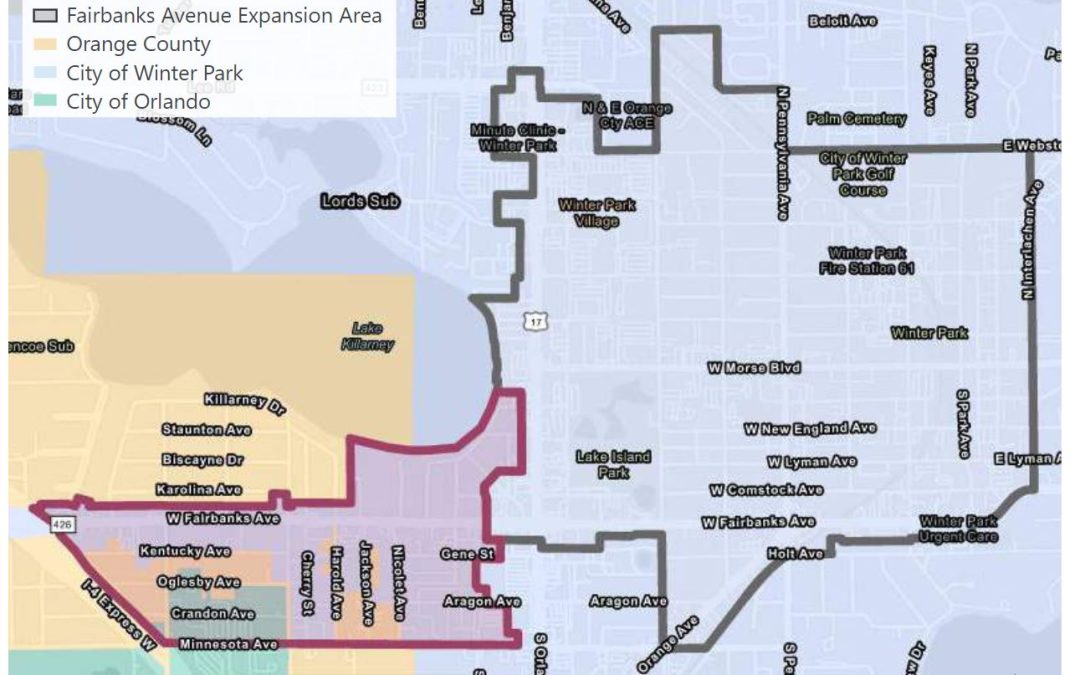
by Beth Kassab | Mar 23, 2024 | City Commission, News, Uncategorized
What to watch this week: Anderson's last meeting, CRA and sinkhole risk near MLK Park
The City Commission is also set to give final approval to the expansion of the CRA before Orange County takes up the matter this summer
March 22, 2024
By Beth Kassab
This week Mayor Phil Anderson will preside over his final City Commission meeting, ending a three-year term when new Mayor Sheila DeCiccio is sworn in next month.
Anderson, who first served as a commissioner from 2008 to 2011, will depart with a number of accomplishments, including likely final approval of the Community Redevelopment Agency expansion plan at his last meeting.
Commissioners are expected to take up the plan again on Wednesday, it’s final stop before going before the Orange County Board of Commissioners sometime this summer.
“This is a really big deal,” Anderson said after the commission reviewed the plan in the first of two required readings earlier this month. “By getting another 10 years we can do more things, like community centers, affordable housing … Hurricane Ian highlighted storm projects and this is one of the big funding sources.”
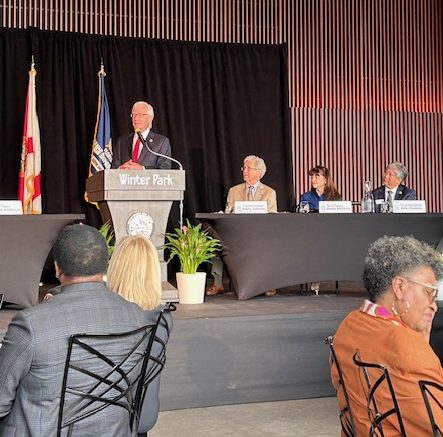
Mayor Phil Anderson gives the State of the City remarks as commissioners Marty Sullivan, Sheila DeCiccio and Kris Cruzada look on.
The plan, which started more than a year ago, calls for the CRA to be extended by 10 years — through 2037 — and grow its boundaries by 142 acres by taking in a former industrial area along Fairbanks Avenue west of U.S. 17-92.
The new CRA, which is controlled by the City Commission, is projected to generate between $162 million and $213 million in revenue through 2037.
CRA’s are used across Florida by cities and counties as a way to finance redevelopment and specific projects. It works like this: property values within a CRA’s boundaries are frozen at a certain year — in this case that year would be 2023. Then, as values rise, any taxes on those properties collected above the frozen amount go into a CRA fund rather than back to the city and county that would typically collect them. (The city and county still collect taxes each year up to the frozen amount and school board taxes are not affected.)
That means dollars paid by CRA property owners that would typically go to Orange County and Winter Park would instead go to a fund to directly benefit the CRA. The portion from Orange County will provide significant additional revenue for projects that Winter Park otherwise wouldn’t control.
The plan calls for the money to go to affordable housing (in the form of new projects and rehabilitating current housing), street and transportation projects and infrastructure improvements.
Sinkholes at MLK Park?
Also on Wednesday, commissioners will hear a report from a consultant about the risk of sinkholes in and around MLK Park. The consultant did not find an elevated risk in the area, according to public documents.
The study came in response from residents concerned about the area that includes the Winter Park Library and Events Center and a sinkhole that opened in the 1980s that is now a small pond near Denning Drive and Orange Avenue.
Commissioners have said they wanted to understand the risks in the area before moving ahead with adding additional parking near the events center.
New B&B request
The owners of five of six units at Villa Vienda Condominiums (221 Holt Avenue) is asking for approval to convert the condos into a bed & breakfast in order to use them as Air B&B or VRBO properties.
The building was historically occupied by Rollins students and the owners are no longer happy with that arrangement because of frequent maintenance issues and the location near the campus makes it difficult to find other renters. As a result they are requesting to comply with the city’s B&B rules.
“This is a unique scenario and an especially unique location,” says a staff memo about the request, which adds that the neighbors are in support of the change.
WinterParkVoiceEditor@gmail.com
To comment or read comments from others, click here →

by Beth Kassab | Mar 22, 2024 | City Commission, Election, News, Uncategorized
Five takeaways from Winter Park's election
Big turnout and big money helped drive this year’s elections
March 21, 2024
By Beth Kassab
Winter Park elected a new mayor and sent two of the Seat 2 candidates into a run-off set for April 16. Here’s five takeaways from the results:
1. Glass ceiling shattered. Sheila DeCiccio wasn’t the first woman to run for mayor in Winter Park, but she is the first to win the post in the city’s 142-year history. DeCiccio, an attorney who has lived in Winter Park for nearly 40 years, joins Eatonville’s Angie Gardner and Oakland’s Kathy Stark as the only other women mayors currently in Orange County. Orlando, the county’s largest city, hasn’t had a woman at the helm since Glenda Hood left office in 2003. DeCiccio, who was first elected to the Winter Park City Commission in 2020 and took more than 71% of the vote on Tuesday, said she is thrilled to bring a new era to the city. “I ran based on my experience and I didn’t make an issue out of being the first woman, but yes, it’s great to break the glass ceiling — it always is and I’m happy I was able to do it.”
2. Party politics not a sure thing. With the Republican presidential primary on the same ballot as the city elections for Republican voters, party politics might have seemed like a good strategy. Afterall, Donald Trump easily won every precinct in Winter Park. But the candidates who tried to seize on that tactic fared the worst. Registered Republicans slightly outnumber Democrats in the city (8,300 R’s vs. 7,700 D’s plus 5,200 registered with another party or without any party affiliation) but that didn’t translate to wins for those who tried to align themselves with the right. Stockton Reeves, who had text messages sent out by the state GOP touting him as “your OFFICIAL Republican nominee” in the nonpartisan Seat 2 race and who also sent out mailers that called out “higher prices and inflation” came in third out of three candidates. Michael Cameron, who ran against DeCiccio, used hashtags like “red wave” and “conservative” in some social media posts and spent most of his tiny campaign account on a Republican political consultant. The other thing Reeves and Cameron had in common? Neither showed for public candidate forums — perhaps an indication that talking directly to voters matters more than party in local politics.
3. The money matters. The size of a candidate’s campaign chest doesn’t always determine who wins, but it can count for a lot. In the Seat 2 race, Craig Russell was the top vote getter by 8 points with 42% of the vote and also spent the most or had the most spent on his behalf. Russell, a teacher at Winter Park High School, raised $64,000 and the political action committee affiliated with the local Chamber of Commerce raised another $22,000 to spend on mailers and other activities to support his candidacy. That’s a combined $86,000 compared to $45,000 raised by Jason Johnson, who received 34% of the vote. The two will head into a runoff on April 16 since neither captured more than 50%. But if money were the only deciding factor, then Reeves, who loaned himself more than $50,000 and raised another $20,000, would be in the runoff since he outraised and outspent Johnson. He took just 24% of the vote. In the mayor’s race, DeCiccio far outraised Cameron — more than $41,000 compared to less than $7,000, according to the latest financial reports.
4. Winter Park knows how to turn out. The city has a reputation for being among the most civically active in the county and that held true again. Overall turnout across the mostly blue county dipped by 8 points to 18% since the Democrats opted against a presidential primary vote in Florida (in 2020, the last time both parties had presidential primaries in March, countywide turnout was more than 26%). But Winter Park turnout held fairly steady at 31% compared to nearly 32% in 2020. Only the much smaller cities of Oakland and Eatonville brought out a higher rate of voters for municipal races this time around. In Winter Garden, municipal race turnout was just 8% while Ocoee and Apopka each showed 14%. And while Winter Park is Orange’s fifth largest city with 30,000 people, it saw the most voters with nearly 7,000 people casting a ballot. That figure included the highest percent of Democrats (31%) except for Oakland (35%), the west Orange city of fewer than 4,000 people.
5. Will turnout hold for the runoff? Turning out voters once is hard. Getting them to show up at the polls twice can be even more difficult. That’s why state and national numbers show fewer voters tend to vote in runoffs. But Winter Park’s engagement appears to buck that trend. The last time Winter Park held a runoff was 2019 when Todd Weaver beat Pete Weldon for Seat 4. A look at the numbers shows 726 more people voted in the April runoff than in the first March election — 6,129 vs. 5,403. No one knows what will happen this year, but a drop in participation is not a sure thing in Winter Park.
WinterParkVoiceEditor@gmail.com
To comment or read comments from others, click here →
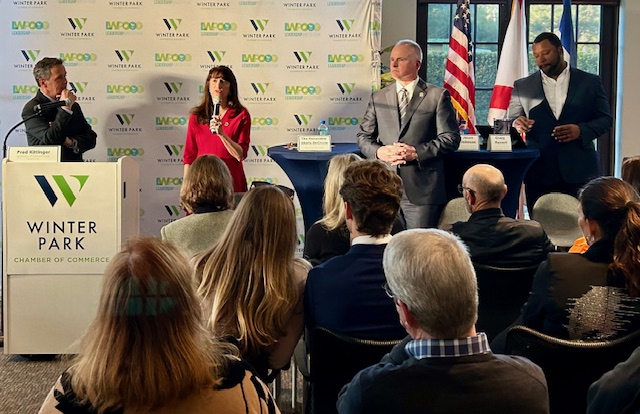
by Beth Kassab | Mar 19, 2024 | City Commission, Election, News, Uncategorized
Sheila DeCiccio is Winter Park's next mayor
Craig Russell and Jason Johnson head to run-off for Seat 2 on City Commission
March 19, 2024
By Beth Kassab
Sheila DeCiccio will be Winter Park’s next mayor — the first woman to serve in the role — after she won more than 70% of the vote Tuesday.
Her opponent, Michael Cameron, who barely raised any money and did not appear at a single public or private forum, took 29% of the vote.

DeCiccio, who was first elected as a commissioner in 2020, is known for pushing to shore up the city’s infrastructure in the wake of flooding after Hurricane Ian in 2022. She also played a key role in overturning the original Orange Avenue Overlay, which allowed for taller and denser development along Orange between Rollins College and U.S. 17-92.
She is the first woman to be elected to the post in the city of 30,000’s 142-year history. She won every precinct in Winter Park by a wide margin.
Two of the three Seat 2 candidates will take their heated contest into a run-off on April 16 after no candidate won more than 50 percent of the vote.
Craig Russell, a teacher and coach at Winter Park High School, won 42% of the vote and Jason Johnson, an attorney, took 34%.
Russell and Johnson have clearly staked out different positions on some issues.
Russell, who raised nearly $64,000 and was the only candidate endorsed by the Winter Park Chamber of Commerce, has said he is open to revisiting the original Orange Avenue Overlay as well as a series of charter amendments overwhelmingly approved by voters in 2022 that require a supermajority vote on the City Commission for certain zoning changes.
Russell did not immediately respond to a request for comment on the results.

Johnson, who raised $45,000, has said he supports the current OAO and doesn’t want to see Winter Park’s commercial corridors expanded or dramatically altered by new development.
“I fully expected this race to go into a run-off,” Johnson said Tuesday evening. “I’m happy to be one of the top two vote getters … There are certainly differences between myself and Mr. Russell and, as always, the voters of Winter Park will get the final say on who they want representing them in City Hall.”
Stockton Reeves, the third candidate in the race, won 24% of the vote. Reeves did not immediately respond to a request for comment.
WinterParkVoiceEditor@gmail.com
To comment or read comments from others, click here →












Recent Comments